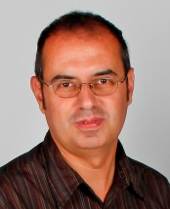Back to Editor profile » Dr Juan Fernandez-Recio
Dr Juan Fernandez-Recio

Dr Juan Fernandez-Recio
Dr Fernández-Recio is leading the Protein Interactions and Docking group at the Life Sciences Department of the Barcelona Supercomputing Center. During his PhD thesis research in Biochemistry at the University of Zaragoza (Spain), supervised by Prof Carlos Gómez-Moreno and Prof Javier Sancho, he characterized the biophysical role of specific residue interactions in protein folding and stability. As a research associate with Prof Ruben Abagyan at the Scripps Research Institute in California, he developed innovative computational tools for the structural prediction and characterization of protein–protein complexes. As a Marie Curie Research Fellow within the group of Prof Sir Tom Blundell at the University of Cambridge in UK, he developed highly efficient docking schemes, combining theoretical energy considerations and data-driven scoring, and provided computational models for a number of protein–protein complexes as well as new insights on the protein association mechanism.
Dr Fernández-Recio's past research at the Barcelona Supercomputing Center has been devoted to the theoretical study of biological phenomena at molecular level and the development of novel computer tools for the structural prediction and characterization of protein–protein and protein–RNA interactions. He devised innovative methods for the prediction of hot-spot residues or protein-nucleic acid interfaces, and has been actively involved in multi-disciplinary collaborations for the study of systems of biomedical interest, like the interaction between polygalactorunase and its inhibitor, the nucleic acid binding properties of translin, or the dynamics of oligomerization of diverse systems by SAXS. His current research includes the application of high-performance computing techniques to current challenges in docking, such as modeling of flexible complexes, interactomics, or drug discovery targeting protein–protein interactions.
Dr Fernández-Recio has been an active participant in the CAPRI communitywide experiment for the evaluation of protein–protein docking methods since it started in 2001. At national and international levels, he has served as evaluator of multiple grant agencies and has acted as reviewer, guest editor, and member of the editorial advisory boards in many different scientific journals.
Updated 17 February 2023
